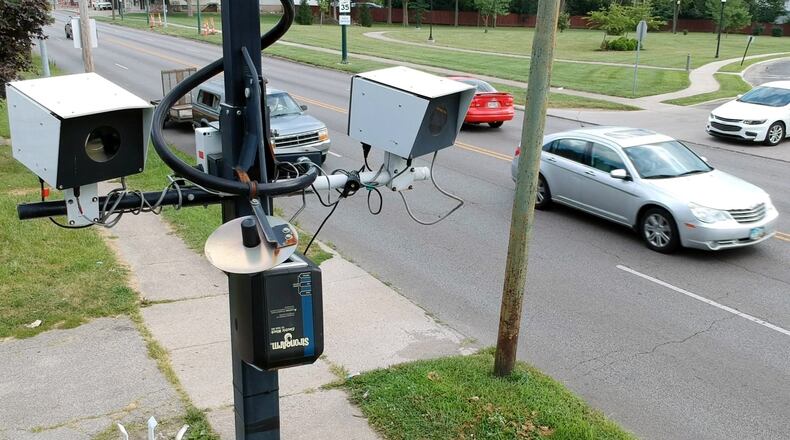Montgomery County Common Pleas Judge Mary Katherine Huffman this week granted a temporary restraining order that prevents the state from enforcing its new rules on Dayton’s automated traffic camera program.
Millions of dollars may hang in the balance, but city officials say their main concerns are local rule and the state limiting and interfering with a program that makes Dayton’s motoring public and roadways safer.
“What’s at stake here is our home rule authority and local municipal legislative power, and basically the state is infringing on that with these restrictions,” said John Musto, chief trial counsel with Dayton’s law department. “These cameras make our streets safer.”
State officials did not immediately return requests for comment Thursday.
In 2018, state Rep. Bill Seitz, R-Cincinnati, said the restrictions would determine whether cities’ claims that use of the cameras is really about traffic safety instead of generating revenue.
“The simple theory here is that if political subdivisions chose to rely on red light and speed cameras to raise their revenues, they do not need our Local Government Fund money to that extent,” Seitz said.
On Wednesday, Huffman approved a temporary restraining order for Dayton that blocks the state from enforcing provisions of House Bill 62, which put new restrictions on Ohio cities’ use of automated traffic cameras.
The restraining order will last until there is a full briefing of the case, which needs to occur before mid-August, the judge’s order states.
On Monday, the city of Dayton filed a lawsuit seeking a permanent injunction and declaratory judgment that provisions of H.B. 62 are unconstitutional.
The city claims parts of the law related to traffic cameras violate cities’ home rule rights and are similar to state regulations that previously were struck down by the Ohio Supreme Court and other courts for being unlawful.
“We think this is our home-rule right and that cameras change behavior,” said Dayton Mayor Nan Whaley.
Ohio is a home rule state and local control makes it different from other states, Whaley said.
“There’s things cities do that I disagree with, but that’s the right of local control,” she said.
The mayor said residents like the cameras because they slow traffic on busy streets.
H.B. 62 requires that cities that use automated traffic cameras submit reports to the Ohio tax commissioner by July 31 showing how much they collected in civil fines during the preceding fiscal year.
The state then will reduce cities’ local government fund payments by the same amount of fine revenue. The reduction in funding will be spread across 12 months of payments.
The city has received $3.3 million in local government payments in the first half of 2019. The city projects $6.6 million in local government payments this year.
The city received nearly $1.9 million in net revenue from its traffic camera program in 2018, which does not count payments to vendors, hearing officers and refunds.
The city’s camera program was not fully operational until mid-2018. Collections for the photo enforcement program were nearly $2.3 million from July 2018 to June 2019, the city said.
The temporary injunction will remain in place until the court decides whether to grant a preliminary injunction, and the city’s end goal is to obtain a permanent injunction, Musto said.
The state law requires the city to file every notice of violation with Dayton Municipal Court and pay upfront court costs and filing fees, even if the city never collects the fines, Musto said.
Traffic studies show sizable reductions in crashes at intersections where cameras have been installed, the city says.
“There is a reduction in accidents, injuries and deaths at the locations where these cameras are,” Musto said. “After we shut them down last time, there was a dramatic increase in violations and accidents at these locations.”
Musto said he’s confident the city’s arguments are supported by case law. But, he said, the last time the city successfully challenged state law restricting the use of automated traffic cameras it took more than two years for the case to work its way up to and be decided by the Ohio Supreme Court.
“We’ve still got a significant amount of work to do,” he said.
WHAT YOU NEED TO KNOW
Still citing: The Dayton speed and red-light cameras are still on, and drivers will need to pay any fines levied.
Still fighting: Dayton is seeking a permanent order to block the state from reducing its local government funds based on the camera enforcement program.
The stakes: Dayton says home-rule power and road safety prompted the legal battle, but state lawmakers say cities want money generated by automated traffic cameras.
About the Author

